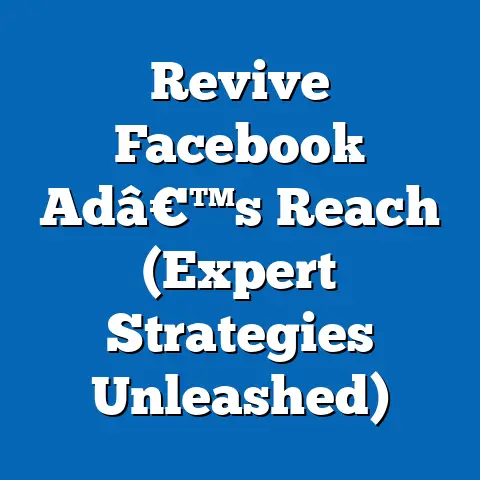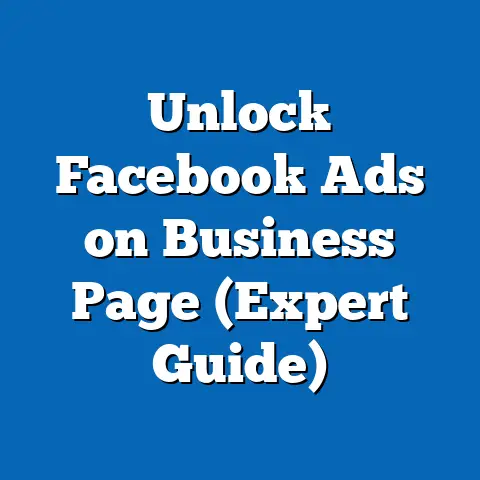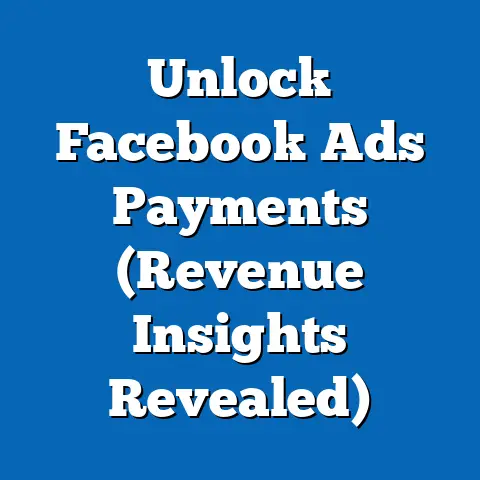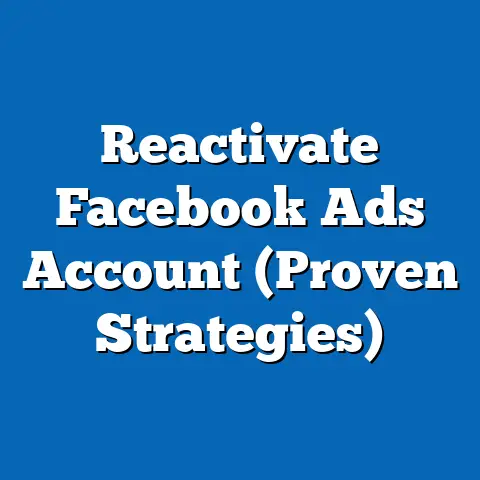Do Facebook Ads Allow Gun Promotions? (Must-Know Guidelines)
I remember a time when advertising was a simpler beast.
Giant billboards looming over highways, catchy jingles blaring from the TV during commercial breaks, and glossy print ads promising the world in magazines.
These were the kings of influence, shaping consumer behavior and embedding themselves in the cultural zeitgeist.
Now, fast forward to today, and the landscape is unrecognizable.
Social media, particularly Facebook, has completely reshaped the advertising game.
We’re no longer passively absorbing messages; we’re actively engaging, sharing, and influencing each other.
And within this dynamic ecosystem, a particularly complex question arises: Do Facebook ads allow gun promotions?
The answer isn’t a simple yes or no.
It’s a nuanced dance between policy, law, public sentiment, and the ever-evolving nature of the platform itself.
Section 1: Understanding Facebook’s Advertising Policy
Navigating the world of Facebook advertising can feel like traversing a minefield, especially when you’re dealing with a sensitive topic like firearms.
Facebook’s advertising policies are comprehensive, and they are constantly being updated.
Understanding these guidelines is paramount for any advertiser, but it’s absolutely critical when you’re in a regulated industry like firearms.
Overview of Facebook’s Advertising Guidelines
Facebook’s advertising guidelines are designed to create a safe and respectful environment for its users.
They cover a wide range of topics, from prohibited content to restrictions on targeting and ad formats.
The core principle is to prevent ads that are misleading, deceptive, or offensive.
These guidelines are not just suggestions; they’re rules.
Violating them can lead to ad disapproval, account suspension, or even permanent banishment from the platform.
For firearms and related products, the restrictions are particularly stringent.
Facebook’s policies aim to balance the rights of advertisers with the need to protect its users from potential harm.
This means that while some gun-related advertising might be allowed under certain conditions, the platform has a zero-tolerance policy for promoting violence or the unsafe use of firearms.
It’s important to remember that Facebook is a global platform, and its policies are designed to comply with laws and cultural norms in different regions.
Takeaway: Familiarize yourself with Facebook’s advertising policies, paying close attention to sections on prohibited content, restricted content, and violence.
Specific Policies on Gun Promotions
Facebook’s policies on gun promotions are clear: the promotion of firearms, firearm parts, and ammunition is heavily restricted.
Facebook explicitly prohibits ads that:
- Promote the sale of firearms or firearm parts: This includes complete firearms, as well as components like magazines, silencers, and conversion kits.
- Promote the sale of ammunition: This covers all types of ammunition, including bullets, shells, and cartridges.
- Depict firearms in a violent or unsafe manner: This includes images or videos that show people using firearms recklessly or in a way that glorifies violence.
- Target minors: Ads promoting firearms cannot be targeted to individuals under the age of 18.
However, there are some exceptions. Facebook may allow ads that:
- Promote responsible gun ownership: These ads typically focus on gun safety courses, responsible storage practices, and the importance of following local laws.
- Promote shooting ranges or gun clubs: These ads must adhere to strict guidelines and cannot promote the sale of firearms or ammunition.
- Promote hunting or sporting events: These ads must be carefully crafted to avoid promoting violence or the unsafe use of firearms.
The rationale behind these policies is multifaceted.
Facebook aims to prevent the platform from being used to facilitate illegal gun sales, promote violence, or endanger its users.
The company also takes into account the legal and regulatory landscape surrounding firearms, as well as public sentiment on gun control.
By restricting gun promotions, Facebook seeks to create a safer and more responsible online environment.
I’ve seen firsthand how quickly Facebook can react to violations of these policies.
A client of mine, a sporting goods store, ran an ad featuring a hunting rifle without clearly stating its caliber.
The ad was almost immediately flagged and taken down, and the client received a warning about violating Facebook’s advertising policies.
It was a wake-up call that highlighted the importance of meticulous compliance.
Takeaway: Understand the specific prohibitions and conditions related to gun promotions on Facebook.
Focus on promoting responsible gun ownership, safety courses, and related activities.
Section 2: Legal Framework Governing Gun Promotions
Beyond Facebook’s own policies, the advertising of firearms is also subject to a complex web of federal and state laws.
Understanding these legal frameworks is essential for any advertiser looking to promote gun-related products on Facebook.
Federal and State Laws
In the United States, the Gun Control Act (GCA) of 1968 is the primary federal law governing the sale and advertising of firearms.
The GCA requires that all firearms dealers be licensed and prohibits the sale of firearms to certain individuals, such as convicted felons and those under the age of 21.
The GCA also regulates the interstate sale of firearms, requiring that all such sales be conducted through licensed dealers.
In addition to the GCA, many states have their own laws regulating the sale and advertising of firearms.
These laws vary widely from state to state, with some states imposing stricter restrictions than others.
For example, some states require background checks for all firearm sales, while others have banned certain types of firearms altogether.
Similarly, some states have laws regulating the advertising of firearms, while others do not.
Advertisers need to be aware of both federal and state laws when promoting firearms on Facebook.
This means ensuring that their ads comply with all applicable regulations, including age restrictions, background check requirements, and restrictions on the types of firearms that can be advertised.
Failure to comply with these laws can result in hefty fines, criminal charges, and damage to your brand’s reputation.
It’s crucial to consult with legal counsel to ensure that your advertising campaigns comply with all applicable laws and regulations.
This is especially important if you’re advertising in multiple states, as the laws can vary significantly.
Takeaway: Research and understand the federal and state laws governing the sale and advertising of firearms.
Consult with legal counsel to ensure compliance.
Age Restrictions and Targeting
Age restrictions are a critical component of both Facebook’s advertising policies and federal and state laws governing gun promotions.
Facebook prohibits ads that promote firearms from being targeted to individuals under the age of 18.
This is in line with federal law, which prohibits the sale of handguns to individuals under the age of 21 and long guns to individuals under the age of 18.
However, age restrictions are not the only consideration when targeting gun-related ads.
Advertisers must also ensure that their ads are not targeted to individuals who are prohibited from owning firearms under federal or state law.
This includes convicted felons, individuals with a history of domestic violence, and those who have been involuntarily committed to a mental institution.
Facebook provides a variety of targeting options that advertisers can use to reach specific demographics and interests.
However, it’s important to use these options responsibly and ethically.
Avoid targeting ads to groups that are at high risk of gun violence or that are particularly vulnerable to the negative effects of gun violence.
I remember advising a client who wanted to target their gun safety course ads to young adults.
While technically they could target 18-24 year olds, we decided to focus on those over 21, given the legal landscape surrounding handgun ownership.
It was a small adjustment that made a big difference in ensuring compliance and responsible advertising.
Takeaway: Adhere to strict age restrictions when targeting gun-related ads.
Avoid targeting individuals who are prohibited from owning firearms or who are at high risk of gun violence.
Section 3: Navigating the Facebook Advertising Interface
Creating a Facebook ad, especially when promoting gun-related products, requires a meticulous approach.
You need to understand the interface, the available tools, and how to use them to create ads that comply with Facebook’s policies and resonate with your target audience.
Setting Up Ads for Gun Promotions
Here’s a step-by-step guide on how to create a Facebook ad for gun-related products while complying with Facebook’s guidelines:
- Create a Facebook Business Account: If you don’t already have one, create a Facebook Business Account.
This is essential for managing your ads and accessing advanced features. - Set Up Your Ad Account: Within your Business Account, create an Ad Account.
You’ll need to provide your business information and payment details. - Choose Your Campaign Objective: Select a campaign objective that aligns with your advertising goals.
For gun-related products, consider objectives like “Brand Awareness,” “Reach,” or “Traffic.” Avoid objectives like “Lead Generation” or “Sales,” as they may be more likely to trigger policy violations. - Define Your Target Audience: Use Facebook’s targeting options to define your ideal customer.
Consider factors like age, gender, location, interests, and behaviors.
Be sure to exclude individuals under the age of 18 and those who are prohibited from owning firearms. - Choose Your Ad Placement: Select the ad placements where you want your ads to appear.
Facebook offers a variety of placements, including the Facebook News Feed, Instagram Feed, Audience Network, and Messenger.
Consider your target audience and the types of content they are most likely to engage with when choosing your placements. - Create Your Ad Creative: This is where you’ll create the visual and textual elements of your ad.
Be sure to follow Facebook’s guidelines on prohibited content and restricted content.
Avoid depicting firearms in a violent or unsafe manner and focus on promoting responsible gun ownership. - Set Your Budget and Schedule: Determine how much you’re willing to spend on your ad campaign and how long you want it to run.
Facebook offers a variety of budgeting options, including daily budgets and lifetime budgets. - Review and Submit Your Ad: Before submitting your ad, carefully review all of the settings and content to ensure that it complies with Facebook’s policies.
Once you’re satisfied, submit your ad for review. - Monitor Your Ad Performance: Once your ad is approved and running, monitor its performance closely.
Pay attention to metrics like reach, impressions, clicks, and conversions.
Use this data to optimize your ad campaign and improve your results.
Takeaway: Follow these steps carefully when setting up your Facebook ad for gun-related products.
Pay close attention to Facebook’s guidelines and monitor your ad performance closely.
Ad Formats and Best Practices
Facebook offers a variety of ad formats that advertisers can use to promote their products and services.
For gun-related products, some ad formats are more effective than others.
Here are a few examples:
- Image Ads: Image ads are a simple and effective way to showcase your products.
Use high-quality images that are visually appealing and that comply with Facebook’s guidelines. - Video Ads: Video ads are a more engaging way to connect with your target audience.
Create videos that are informative, educational, and that promote responsible gun ownership. - Carousel Ads: Carousel ads allow you to showcase multiple products or services in a single ad.
This is a great way to highlight a variety of gun safety courses or responsible storage options. - Collection Ads: Collection ads are a visually immersive ad format that allows users to browse and purchase products directly from your ad.
This format is best suited for e-commerce businesses that sell gun-related products.
Here are some best practices for crafting compelling ad copy and visuals that resonate with your target audience:
- Focus on Safety and Responsibility: Emphasize the importance of responsible gun ownership, safe storage practices, and following local laws.
- Highlight the Benefits of Your Products or Services: Explain how your products or services can help people protect themselves, their families, and their communities.
- Use Clear and Concise Language: Avoid using jargon or technical terms that your target audience may not understand.
- Include a Strong Call to Action: Tell people what you want them to do, whether it’s to visit your website, sign up for a gun safety course, or purchase a product.
- Test Different Ad Creative: Experiment with different images, videos, and ad copy to see what resonates best with your target audience.
I’ve found that using customer testimonials in ads can be incredibly effective.
A quote from a satisfied customer who took a gun safety course and now feels more confident and prepared can be a powerful way to build trust and encourage others to take similar action.
Takeaway: Choose the ad format that best suits your products or services and target audience.
Craft compelling ad copy and visuals that focus on safety, responsibility, and the benefits of your offerings.
Section 4: Case Studies and Examples
Analyzing real-world examples of successful and unsuccessful gun promotions on Facebook can provide valuable insights for advertisers looking to navigate this complex landscape.
Successful Gun Promotions on Facebook
It’s important to note that “successful” doesn’t necessarily mean directly selling firearms.
Success in this context often means promoting responsible gun ownership, safety courses, or related products and services in a way that complies with Facebook’s policies and resonates with the target audience.
- Example 1: Local Shooting Range: A local shooting range ran a Facebook ad campaign promoting their gun safety courses.
The ads featured images of people practicing safe gun handling techniques and emphasized the importance of education and training.
The campaign targeted adults in the local area who were interested in shooting sports and outdoor activities.
The results were impressive, with a significant increase in enrollment in their gun safety courses and positive feedback from the community. - Example 2: Gun Safe Manufacturer: A gun safe manufacturer ran a Facebook ad campaign promoting their line of secure storage solutions.
The ads featured images of their gun safes and highlighted the importance of keeping firearms out of the hands of children and unauthorized individuals.
The campaign targeted gun owners who were concerned about safety and security.
The results were positive, with a noticeable increase in sales of their gun safes. - Example 3: Hunting Apparel Company: A hunting apparel company ran a Facebook ad campaign promoting their line of hunting clothing and gear.
The ads featured images of people enjoying the outdoors while wearing their apparel.
The campaign targeted hunters and outdoor enthusiasts.
The results were successful, with a significant increase in sales of their hunting apparel.
These examples demonstrate that it’s possible to run successful gun-related ad campaigns on Facebook by focusing on responsible gun ownership, safety, and related products and services.
Takeaway: Study successful examples of gun promotions on Facebook to learn from their strategies and tactics.
Focus on promoting responsible gun ownership, safety, and related products and services.
Lessons from Failed Campaigns
Analyzing failed campaigns can be just as valuable as studying successful ones.
Understanding the reasons why an ad campaign failed can help you avoid making the same mistakes.
- Example 1: Online Gun Retailer: An online gun retailer ran a Facebook ad campaign promoting the sale of firearms directly to consumers.
The ads featured images of various firearms and included direct links to their website where people could purchase them.
The ads were quickly flagged and taken down by Facebook for violating their advertising policies.
The retailer received a warning about violating Facebook’s policies and was prohibited from running similar ads in the future. - Example 2: Ammunition Manufacturer: An ammunition manufacturer ran a Facebook ad campaign promoting the sale of ammunition.
The ads featured images of ammunition and included pricing information.
The ads were also quickly flagged and taken down by Facebook for violating their advertising policies.
The manufacturer received a similar warning and was prohibited from running similar ads in the future. - Example 3: Gun Rights Advocacy Group: A gun rights advocacy group ran a Facebook ad campaign that featured inflammatory language and images that were perceived as promoting violence.
The ads were met with widespread criticism and were eventually taken down by Facebook.
The group’s Facebook page was also temporarily suspended for violating Facebook’s community standards.
These examples illustrate the importance of following Facebook’s advertising policies and avoiding content that is prohibited or restricted.
They also highlight the potential consequences of violating these policies, including ad disapproval, account suspension, and damage to your brand’s reputation.
Takeaway: Learn from failed examples of gun promotions on Facebook to avoid making the same mistakes.
Avoid promoting the sale of firearms or ammunition directly to consumers and avoid content that is inflammatory or promotes violence.
Section 5: Impact of Public Sentiment and Controversies
Facebook’s advertising policies are not created in a vacuum.
They are influenced by a variety of factors, including public sentiment on gun control and the controversies that have arisen from gun promotions on the platform.
Public Perception of Gun Ads
Public sentiment on gun control is highly polarized in the United States.
Some people believe that gun ownership is a fundamental right and that restrictions on firearms should be minimal.
Others believe that gun violence is a serious problem and that stricter gun control laws are necessary to protect public safety.
This polarization is reflected in the public’s perception of gun ads on Facebook.
Some people are comfortable seeing ads for gun-related products and services, while others find them offensive or disturbing.
This is especially true when the ads are targeted to vulnerable groups, such as children or individuals who have experienced gun violence.
Facebook is sensitive to public sentiment on gun control and has taken steps to address concerns about gun ads on the platform.
This includes restricting the types of content that can be advertised, limiting the targeting options that advertisers can use, and increasing transparency around gun ads.
It’s important for advertisers to be aware of public sentiment on gun control when creating and running gun-related ads on Facebook.
Consider the potential impact of your ads on different segments of the population and be prepared to address any concerns or criticisms that may arise.
Takeaway: Be aware of public sentiment on gun control when creating and running gun-related ads on Facebook.
Consider the potential impact of your ads on different segments of the population and be prepared to address any concerns or criticisms that may arise.
Controversies Surrounding Gun Promotion
There have been several controversies surrounding gun promotions on Facebook over the years.
These controversies have often involved ads that were perceived as promoting violence, targeting vulnerable groups, or violating Facebook’s advertising policies.
- Example 1: Sandy Hook Lawsuit: In 2012, a mass shooting at Sandy Hook Elementary School in Newtown, Connecticut, claimed the lives of 20 children and 6 adults.
Following the shooting, several families of the victims filed a lawsuit against Remington Arms, the manufacturer of the AR-15 rifle used in the shooting.
The lawsuit alleged that Remington Arms had negligently marketed the AR-15 to civilians, contributing to the massacre.
The lawsuit was eventually settled for $73 million.
This case highlighted the potential legal risks associated with marketing firearms to civilians. - Example 2: Parkland Shooting Boycott: In 2018, a mass shooting at Marjory Stoneman Douglas High School in Parkland, Florida, claimed the lives of 17 students and staff members.
Following the shooting, several student activists launched a boycott campaign against companies that advertised on the NRA’s website and social media channels.
The boycott campaign was successful in pressuring several companies to withdraw their advertising from the NRA.
This case demonstrated the power of consumer activism to influence corporate behavior on gun control. - Example 3: Facebook’s Ban on Gun Parts: In 2019, Facebook announced a ban on ads for gun parts, including magazines, silencers, and conversion kits.
The ban was in response to criticism that Facebook was allowing ads for these products to be targeted to individuals who were prohibited from owning firearms.
This case highlighted the importance of Facebook’s advertising policies in preventing the illegal sale of firearms.
These controversies have had a significant impact on Facebook’s advertising policies and have led to increased scrutiny of gun promotions on the platform.
Takeaway: Be aware of the controversies surrounding gun promotions on Facebook and the potential impact on your brand’s reputation.
Follow Facebook’s advertising policies carefully and avoid content that is prohibited or restricted.
Section 6: Future of Gun Promotions on Facebook
The future of gun promotions on Facebook is uncertain.
The platform’s advertising policies are constantly evolving, and it’s likely that they will continue to be influenced by public sentiment, legal developments, and technological advancements.
Trends in Social Media Advertising
Several trends in social media advertising could affect the future of gun promotions on Facebook.
These include:
- Increased Regulation: Governments around the world are increasingly scrutinizing social media platforms and their advertising practices.
It’s possible that we will see increased regulation of gun promotions on social media in the future. - Enhanced Targeting Capabilities: Social media platforms are constantly developing new and improved targeting capabilities.
This could allow advertisers to target gun-related ads to specific demographics and interests with greater precision.
However, it could also raise concerns about privacy and the potential for misuse. - Artificial Intelligence (AI): AI is playing an increasingly important role in social media advertising.
AI can be used to automate ad creation, optimize ad targeting, and detect and remove prohibited content.
This could help Facebook to better enforce its advertising policies and prevent the illegal sale of firearms. - Metaverse Advertising: As the metaverse continues to develop, it’s possible that we will see new opportunities for gun promotions in virtual worlds.
However, this could also raise new ethical and regulatory challenges.
These trends suggest that the future of gun promotions on Facebook is likely to be complex and dynamic.
Advertisers will need to stay informed about the latest developments and adapt their strategies accordingly.
Takeaway: Stay informed about the latest trends in social media advertising and their potential impact on gun promotions on Facebook.
Be prepared to adapt your strategies as needed.
Preparing for Policy Changes
The best way to prepare for policy changes related to gun promotions on Facebook is to stay informed and be proactive.
Here are some tips:
- Monitor Facebook’s Advertising Policies: Regularly review Facebook’s advertising policies to stay up-to-date on the latest changes.
- Follow Industry News and Blogs: Stay informed about industry news and blogs that cover social media advertising and gun control.
- Attend Industry Events: Attend industry events to network with other advertisers and learn about best practices.
- Join Online Communities: Join online communities of advertisers and marketers to share information and ask questions.
- Consult with Legal Counsel: Consult with legal counsel to ensure that your advertising campaigns comply with all applicable laws and regulations.
By staying informed and being proactive, you can minimize the risk of violating Facebook’s advertising policies and ensure that your gun promotions are successful and responsible.
Takeaway: Stay informed about policy changes related to gun promotions on Facebook by monitoring Facebook’s advertising policies, following industry news and blogs, attending industry events, joining online communities, and consulting with legal counsel.
Conclusion
Navigating the world of gun promotions on Facebook is a complex and challenging task.
It requires a deep understanding of Facebook’s advertising policies, federal and state laws, public sentiment, and the controversies that have arisen from gun promotions on the platform.
By following the guidelines and best practices outlined in this article, advertisers can increase their chances of running successful and responsible gun-related ad campaigns on Facebook.
It’s important to remember that advertising firearms on social media comes with a great deal of responsibility.
Advertisers must balance the need to promote their products and services with the need to protect public safety and prevent the illegal sale of firearms.
By prioritizing safety, responsibility, and ethical considerations, advertisers can help to create a safer and more responsible online environment for everyone.
The future of gun promotions on Facebook is uncertain, but by staying informed, being proactive, and adapting to the latest developments, advertisers can continue to reach their target audiences and promote their products and services in a responsible and effective manner.
The key is to be aware, be informed, and be responsible.
That’s the only way to navigate this complex landscape successfully.






